Farsight Blogger will be on hiatus for a short time. It seems that designing, writing and illustrating RPG products takes up more time than I thought!
See you soon.
Saturday, 29 September 2018
Thursday, 20 September 2018
[Video] Sandy Petersen talks about writing horror scenarios
I don't usually post videos but this one was incredibly interesting and gave me a few things to think about as I work on 'A Dream of Dead Gods', a campaign I'm designing for the new Eldritch Tales game using the Swords & Wizardry White Box rules.
It's Sandy Petersen's fault that I got into Lovecraft, Call of Cthulhu and this kind of horror gaming in the first place, so it kind of makes sense that I'm taking some cues from the man himself.
It's Sandy Petersen's fault that I got into Lovecraft, Call of Cthulhu and this kind of horror gaming in the first place, so it kind of makes sense that I'm taking some cues from the man himself.
Friday, 14 September 2018
Computer game strategy guides as sourcebooks
 I've picked up some very cheap strategy guides for computer games recently, namely 'Warhammer Online: Age of Reckoning' and 'Dragon Age II', and even though I've played both games I never bought them for the help they'd give me.
I've picked up some very cheap strategy guides for computer games recently, namely 'Warhammer Online: Age of Reckoning' and 'Dragon Age II', and even though I've played both games I never bought them for the help they'd give me.What I got in the books were detailed maps, characters, weapon ideas, adventure and quest ideas, illustrations and a whole slew of new ideas. The books are like system-generic sourcebooks and, even though I won't be using them in the settings they were intended for, there are plenty of bits and bobs in there I can use for my current games.
Once games have been out for a long time and the strategy guides become pretty useless you can find them in all kinds of places - charity shops, second-hand bookshops, discount bookstores and the like. They might not be an accurate fit for your game but there's bound to be something in there that you can cannibalise. I think I'll be seeking out more cheap books like this in the future to help flesh out my home-made roleplaying campaign settings.
Tuesday, 11 September 2018
My kind of Fantasy Adventure
 I enjoy the stories of high adventure, huge magic and exotic locations. They're fun, fast and exciting, and I get plenty of entertainment from a plethora of creatures threatening the heroes in alien landscapes as wizards blast a multitude of fireworks from their fingertips while chanting and gesticulating, and warriors wear impossible suits of armour and wield their two-handed swords one-handed.
I enjoy the stories of high adventure, huge magic and exotic locations. They're fun, fast and exciting, and I get plenty of entertainment from a plethora of creatures threatening the heroes in alien landscapes as wizards blast a multitude of fireworks from their fingertips while chanting and gesticulating, and warriors wear impossible suits of armour and wield their two-handed swords one-handed.But this isn't the kind of fantasy world I would like to live in.
In the 1980s I had two fantasy loves; the television show 'Robin of Sherwood' and the books and radio play of JRR Tolkien.
Robin of Sherwood was a low-fantasy take on the classic legend, with Herne the Hunter, and ancient pagan God of the forests, proclaiming that Robin was his son and that he was here to protect the innocent. There was very low-key magic, mysticism and adventure, a heady mix of pseudo history and fantasy, like the 'one God had come to drive out the many' (as Merlin in the movie 'Excalibur' quite correctly put it). It was quite excellent and the adventures that Robin and his companions had were complemented by the excellent characters in the ensemble and the great writing of Richard Carpenter. This was my kind of fantasy, and my kind of gaming setup; a small band of connected friends fighting against the odds.
Then there was my favourite thing in the world; Middle-earth. The stories of Tolkien, in particular The Hobbit, the Lord of the Rings and the tale of the Children of Hurin, was exactly the kind of stuff I liked best about the fantasy genre. The history of Middle-earth is an explosion of high fantasy, with Gods at war in heaven and tragic high adventure on the surface of the world, but I was more interested in the events of the second and third ages, where the action was centered around a smaller selections of heroes and the grand exploits of history were stories and myths. This gave the setting depth and a realism I have never come across in any other fantasy work. I wanted my own creations to adventure in the low-magic world of the Third and Fourth ages as this felt like a place I could explore and learn about, and old ruins existed for much more involved reasons than simply a place for characters to have a bit of an adventure in.
As with Robin of Sherwood, Middle-earth had a reality to it that was tangible and this was primarily thanks to the movies of Peter Jackson, which gave it a look and atmosphere so real that everything had a place. Robin of Sherwood had the reality of history to frame it.
This is my kind of fantasy. Low-magic, character-driven adventure in which the story and the decisions the characters make drives the fun and frolics. High fantasy magical fireworks and improbable armour is window dressing. When you can tell a superb story with a sword, a run-down castle and a few curious friends then you've got real substance.
Thursday, 6 September 2018
'Triskelion Space' - an interview with Jacob Ross
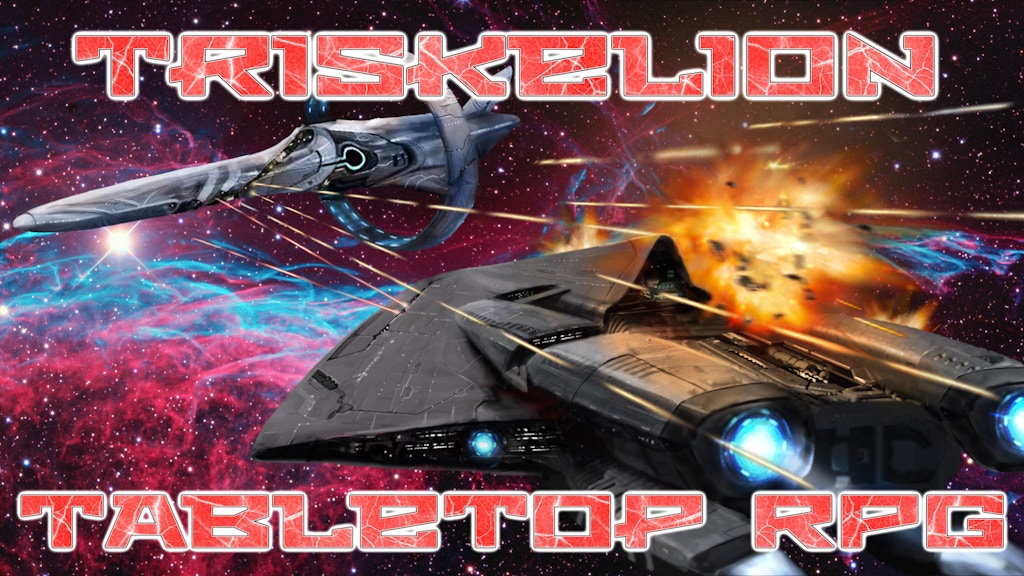 'Triskelion Space' is a new RPG on it's way using the Exodus System. As of this interview the game is running on Kickstarter so get over there and have a look at what it has to offer.
'Triskelion Space' is a new RPG on it's way using the Exodus System. As of this interview the game is running on Kickstarter so get over there and have a look at what it has to offer.I had a brief chat with creator Jacob Ross about his gaming and his games.
Welcome to Farsight Blogger! Please introduce yourself and tell us how you got yourself embroiled in the wonderful world of roleplaying games.
My name is Jacob Ross, I write as Jacob DC Ross to differentiate myself from the award-winning writer from Grenada. The first RPG that I ever owned was WEG's The D6 System: The Customizable Roleplaying Game, by George Strayton. I got it in 1997 from a regular big-box bookstore. From there I found LUG's Star Trek RPG and Legend of the Five Rings.
I fell in love with L5R so hard that 2009 I ended up begging Shawn Carman for a shot at writing for the game line, and bless his heart, he gave me a spot on Enemies of the Empire. I got to write about badgers, sharks, apes and such while the veterans were telling tales about ninja and naga. I didn't care. I was a WRITER now! I got a bigger assignment for the next book, The Great Clans, before branching out. I've written for the first edition of Mongoose Traveller, Modiphius' Star Trek Adventures and other game lines.
Your best known for the best-selling Exodus System RPG rules. What was the genesis of the game?
I see what you did there. Side note, the game was originally called "The Genesis System", before someone informed me that FFG had announced their own "Genesys System" a few weeks earlier. The game system came about because I was having issues at the game table. My absolute favorite RPG campaign of all time is Pirates of Drinax for Traveler. My wife and our friend wanted to play, but because of how long character generation took them, they decided not to go forward.
I decided that I needed to come up with my own system, something that checked off all of my boxes:
- Fast character generation that retains mechanical depth and diversity of abilities
- Spotlight balance, or no situations where wizards are always better at everything than warriors
- Easy GM prep, having generators that allow the GM to prep a scenario after getting home from work and before the rest of the party comes home
- Simple NPC stat blocks since I hate nothing more than finding a system that looks fun, going to write up a scenario for publishing and then seeing that I have to list how many ranks that the starfighter pilot has in "Handle Animals".
I got to work, blended some of my favorite elements from different games and tried it out, then refined things. I am a fan of how Numenera lets you make your own character class, so I adapted the principles behind that design into something that would allow you to have these Pathfinder-like ability tracks but without having to plan out your character build from rank 1. All you have to do is pick which stat to upgrade during character creation, choose a Combat Role, a Party Role and two Flavors for your powers.
Long story short, I wanted something that was easier to customize, both for gameplay and publishing.
You have a Kickstarter running as of this interview, 'Triskelion Space'. What can you tell us about this game that helps recreate 'old-school space opera stories'?
The atmosphere of the setting is oriented towards sci-fantasy space opera in many ways. The Southern Arm of the Triskelion Galaxy is embroiled in war, with the main factions diametrically opposed to one another's philosophy. Grand stories of freedom versus order and all that.
I want to avoid a single faction being seen as a monolith of evil, though. In Star Wars I'd say that the Empire fans are probably equal to the Rebellion fans. In Triskelion Space the Supremacy dominates the northern half of the Southern Arm of space,but it's composed of multiple feuding houses. While they're obligated to support the overall military, each Supreme House fields their own navy and army, too, and is at odds with one or more of their peers. This allows PCs to support a faction that they like without having to join an army that might be liberating a world from alien incursion one day and then slaughtering a village of innocents the next.
Planets in Triskelion Space are not concerned about things like which trade goods are available for purchase, or the percentage of helium in the atmosphere, but by what types of adventures that they facilitate. The spotlight planets have their own encounter tables and problem tables that are geared towards getting into trouble or overcoming heroic opposition.
Alien races are iconic, and include broad stereotypes like the Foi "Elder Aliens" or the various beastmen-inspired uplift-type species. A humanoid rabbit piloting a starfighter through a ridiculously packed asteroid field is my idea of old-school space opera, and that's there. Enormous capital ships disgorging waves of wasp-like strike craft against hapless freedom fighters is my idea of old-school space opera, and that's there, too.
The galaxy is under threat from more than one source, so i's perfectly plausible that members of the Insurgency and Supremacy might even team up for the greater good. Or they might allow their nemeses to face the "Assimilation Bugs from Beyond the Stars" or the tyrannical Flux Mages' secret infiltrators on their own. The one constant, wherever you go, is that every world is in peril, and it is up to idealistic, action-oriented folks to save the day.
The book is also going to be filled with gorgeous artwork, including several interior pictures from Matt Bulahao, who painted the starships fighting on the KS page's banner. Dean Spencer is doing the cover, and his work is unbelievable. Both of these artists and others help to create a visual sense of epic scale.
 |
| A Flux-wielding Star Mystic- Daniel Comerci |
The first Exodus System book is designed for hacking by GMs or publishers. That's why I present both target number-based skill rolls and opposed skill rolls. The first book is also very abstract on vehicle and equipment systems to be easier to adapt to any genre.
Since I wanted more of a two-fisted, pulpy feel, virtually all rolls in Triskelion Space are opposed. Climbing that cliff face isn't a TN of 12, it's your d10 Agility versus the cliff's d8 AD (Action Die). This increases tension because you never know exactly what you have to beat for each roll.
Writing up the sci-fi book, I had requests from readers for, in their words "guns, guns, lots of GUNS". The new equipment system allows you to customize your equipment in thousands of different ways. I also further detailed the starship and vehicle system, plus space combat, commerce, item crafting and more. You can even create ships and mecha to use as PCs instead of human characters. This process is fast and takes only a minute or two per ship.
Space combat now is more cinematic. There are crew positions for virtually any party member so everybody has something to do during a fight. I refined the concept of Scale for this game, making the captical ships an enormous threat, but leaving fighter craft with options to save the day.
What kind of support will 'Triskelion Space' receive in the future?
We're working on a ships and space encounters book with dozens of premade ships and space monsters (beyond those in the core book) and options for ship creation. Think High Guard for Traveller, but it doesn't take an hour to make a vessel. There's also a series of gazeteers in the works, which expand on the non-spotlight planets from the core books and introduce new ones. I also want to introduce competitive, PVP starship battle rules for players who just want to sling missiles and disruptor beams at one another all day long. James Spahn, who wrote White Star, is contributing material, too. I'm really excited to have him aboard!
 |
| Forest Villager Settlement- Windfall |
Wednesday, 5 September 2018
Roleplaying Game Magazines
There are many RPG books I regret parting with during the Great Nerd Purge of 2006, but as much as I miss certain games I also miss the magazines I had.
I had all the Valkyrie and Arcane magazines, which were favourites of mine but I also had a lot of Imagine, early White Dwarf when they supported other games, years and years of Dragon magazine (I kept one issue because I loved the cover) even though I'd stopped playing D&D in 1989.
These were my main ones. I had some GM International and two issues of the Fighting Fantasy magazine Warlock which I STUPIDLY gave away. I also had two issues of Proteus, which was a fun mag but couldn't take the place of my beloved FF.
I miss all those magazines. I've picked up Tabletop Gaming magazine a few times and it's a great publication but I'm not into board and war games as much as I am into RPGs, so I miss the focused magazines of old. The material that's in them you can find quite easily on the internet now so a dedicated printed RPG magazine just wouldn't work now, I don't think, unless DeAgoistini created a collectible version with monthly figures and models.
Yeah. I really regret parting with my gaming mags.




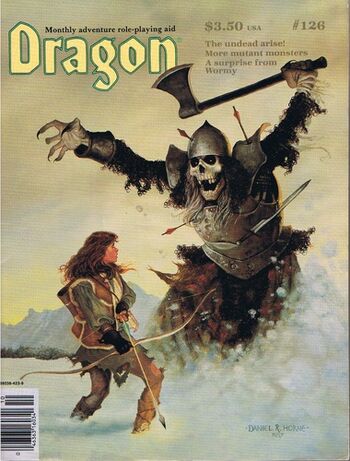
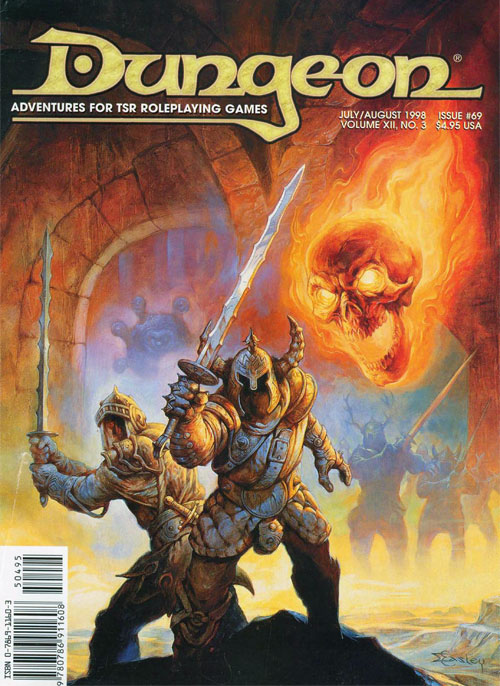



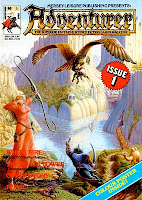


I had all the Valkyrie and Arcane magazines, which were favourites of mine but I also had a lot of Imagine, early White Dwarf when they supported other games, years and years of Dragon magazine (I kept one issue because I loved the cover) even though I'd stopped playing D&D in 1989.
These were my main ones. I had some GM International and two issues of the Fighting Fantasy magazine Warlock which I STUPIDLY gave away. I also had two issues of Proteus, which was a fun mag but couldn't take the place of my beloved FF.
I miss all those magazines. I've picked up Tabletop Gaming magazine a few times and it's a great publication but I'm not into board and war games as much as I am into RPGs, so I miss the focused magazines of old. The material that's in them you can find quite easily on the internet now so a dedicated printed RPG magazine just wouldn't work now, I don't think, unless DeAgoistini created a collectible version with monthly figures and models.
Yeah. I really regret parting with my gaming mags.









Monday, 3 September 2018
'Phaunt's Tower' available now
Available now from DrivethruRPG and RPGNow.
'Welcome to Wherwest!
This is a town full of opportunities at every corner, adventure through every door and danger at every turn. Glory and gold awaits! That is, if you can get past your first night here.
Phaunt’s Tower is an OSR adventure for Swords & Wizardry White Box, although it can be easily adapted for most classic OSR systems. The adventure is designed for a party of four adventurers of any race and class, and can be inserted into your existing campaign quite easily, no matter what world you’re gaming in.
Wherwest is a small town of around a thousand souls, and from here most adventurers can strike out into the surrounding countryside on their travels. It is famous for its hardy defences against the outside world and the great tower that dominates the top of the hill the town is built around. This is the Tower of Phaunt the Eager, a well-respected wizard who is also the Lord of Wherwest. From here he conducts business, holds council and researches his magic. In fact, the blue light that constantly glows at the very top of the tower that juts from the roof is a beacon of solace to travellers far and wide...'
'Welcome to Wherwest!
This is a town full of opportunities at every corner, adventure through every door and danger at every turn. Glory and gold awaits! That is, if you can get past your first night here.
Phaunt’s Tower is an OSR adventure for Swords & Wizardry White Box, although it can be easily adapted for most classic OSR systems. The adventure is designed for a party of four adventurers of any race and class, and can be inserted into your existing campaign quite easily, no matter what world you’re gaming in.
Wherwest is a small town of around a thousand souls, and from here most adventurers can strike out into the surrounding countryside on their travels. It is famous for its hardy defences against the outside world and the great tower that dominates the top of the hill the town is built around. This is the Tower of Phaunt the Eager, a well-respected wizard who is also the Lord of Wherwest. From here he conducts business, holds council and researches his magic. In fact, the blue light that constantly glows at the very top of the tower that juts from the roof is a beacon of solace to travellers far and wide...'
Sunday, 2 September 2018
Eldritch Tales: Lovecraftian White Box Role-Playing
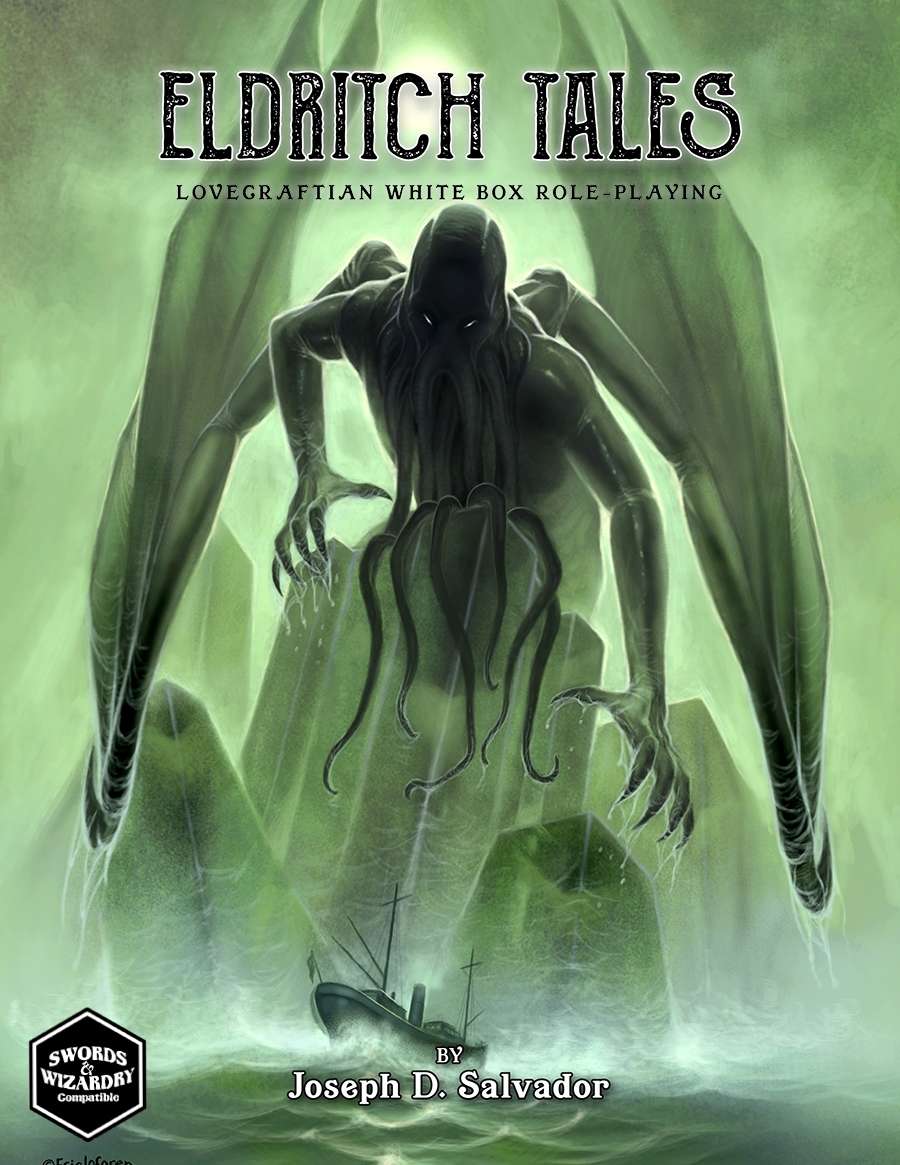 I knew virtually nothing about 'Eldritch Tales' until recently - you'd think a Lovecraft fan like myself would have realised that this was out there, but my Lovecraft roleplaying was focused on Chaosium's 'Call of Cthulhu', so anything else was kind of eclipsed by that.
I knew virtually nothing about 'Eldritch Tales' until recently - you'd think a Lovecraft fan like myself would have realised that this was out there, but my Lovecraft roleplaying was focused on Chaosium's 'Call of Cthulhu', so anything else was kind of eclipsed by that.Recently I got hooked on Swords & Wizardry White Box and I was so enamoured by it that I decided that this was going to be the RPG system I was going to use to write my own material. I had looked at a lot of OGL products but this one in particular excited me as it appealed to my sense of nostalgia; it reminded me of my original days of D&D roleplaying in the 1980s. In fact, I have my first adventure 'Phaunt's Tower' on release now at DrivethruRPG and RPGNow.
So, as I investigated more about Swords & Wizardry products, such as White Star and WWII: Operation WhiteBox, I came across Eldritch Tales and as soon as I saw that striking image of Cthulhu itself looming over that poor boat my Lovecraftometer went off the scale.
I promised myself that I'd wait for POD as I have White Box and White Star in the printed format but my excitement got the better of me and I purchased the PDF. At 10 bucks for 218 pages it was quite the bargain, and the contents of the book did not disappoint.
I will save a full description of the game for my full review once I've had a chance to play it, but suffice to say that after decades of 'Call of Cthulhu' I think I may have found a new version that I'm not only excited to play but excited to write my own OGL material for. I read the whole book in one sitting - I only finished about an hour before writing this blog entry - and it is such a great game. It's so good! It captures the Mythos really well and the writer, Joseph D. Salvador, obviously has a passion for the genre and the writer. Even though it adds a few extra rules and ideas so that you can get a truly great Lovecraftian nightmare played out it manages to retain the simplicity that attracted me to Swords & Wizardry in the first place. It even manages to make sure that the game suits your playstyle; not interested in going mad and dying? Then play it as pulp adventurers and throw some punches at the nearest Mi-Go.
As I said, I will have a full review out for it in the near future but rest assured that if you're a fan of Lovecraft, horror, and even the original 'Call of Cthulhu' game, then this is something well worth checking out.
'Eldritch Tales: Lovecraftian White Box Role-Playing in an OSR rule set with its roots in the Original version of the world's favorite RPG, but instead of exploring musty dungeons, characters in Eldritch Tales investigate Mythos horrors in the 1920s! The setting and background are based on the cosmic horror tales of Howard Phillips Lovecraft and other members of his writing circle.
Within the pages of Eldritch Tales you will find four character classes representing many classic pulp archetypes, occupations, rules for insanity, spells, monsters, esoteric tomes, artifacts, a starting scenario, and setting material, as well as advice on using Eldritch Tales with other White Box games. This game is compatible with Swords & Wizardry White Box and other OSR games.
To accomodate all devices, the PDF purchase includes versions in both high resolution and low resolution. PDF has a bookmarked Table of Contents, as well as linked terms throughout the book.
Eldritch Tales offers a Compatibility License to third-party publishers interested in creating material to support the game, find it here on RPGNow or DriveThruRPG!'
